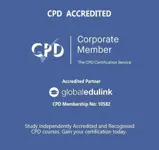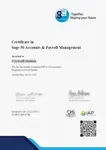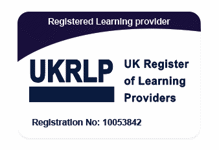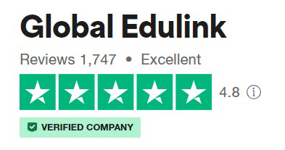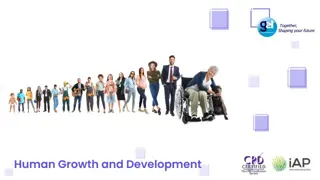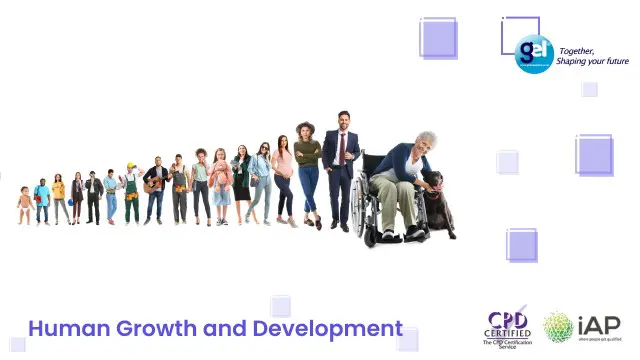
Human Growth and Development
Accredited by CPD & iAP | FREE PDF Certificate Included | Unlimited Access for 365 Days | Quality Study Materials
Global Edulink
Summary
- Exam(s) / assessment(s) is included in price
Overview
Diploma in Human Growth and Development
Are you interested in human development?
All of us have something in common, we have all been born and we have all grown up (well, most of us have anyway). This Diploma in Human Growth and Development (USA Standards) gives a deeper understanding of this process that we go through. Explore the different stages of human development, understand what different factors can effect human growth and development. Having a diploma in this subject would qualify you to work in social care, counselling or education and will provide a whole host of transferable skills.
Learning with Global Edulink has many advantages. The course material is delivered straight to you and can be adapted to fit in with your lifestyle. It is created by experts within the industry, meaning you are receiving accurate information, which is up-to-date and easy to understand.
This course is comprised of professionally narrated e-Learning modules, interactive quizzes, tests and exams. All delivered through a system that you will have access to 24 hours a day, 7 days a week for 365 days (12 months). An effective support service and study materials will build your confidence to secure your qualification.
Please Note: This Course is Based on USA Standards.
CPD
Course media
Description
This online training course is comprehensive and designed to cover the topics listed under the curriculum.
COURSE CURRICULUM
Module 01 : Applying Theoretical Approaches to Human Growth and Development
- Introduction
- Nature
- Environmental Influences on Gender Differences
- Self-Socialization
- Promoting Gender Equity in the Classroom
- Lesson Summary
- Phychoanalytic Theories
- Psychosexual Development
- Psychosocial Development
- Operant Conditioning
- Social Learning Technology
- Cognitive Development
- System Theories
- Evolutionary Developmental Psychology
- Epigenetic Psychobiological Systems Perspective
- Ecological Systems Theory
- Sigmund Freud
- Locomotor Stage
- Two Types of Punishment
- Symbolic Models
- Self-Efficacy
- Accommodation
Module 02 : Overview of Research Methods and the Study of Human Growth and Development
- The Scientific Method Defined
- Application in Human Development
- The Scientific Method
- Hypothesis
- Make a Conclusion Based on The Data
- Descriptive Statistics
- Make the Result Available to Others
- Develop Hypothesis
- Test Your Hypothesis
- Inaccurate Data Collection
- Primary Data Collection
- Observational Techniques
- Experimental Techniques
- The Multi Method Approach
- True experiment
- Experimental Group
- Control Group
- Random sample
- Research Without an Experiment
- Common Research Designs
- Case Study
- Correlational Research
- Cross Sectional Research
- Longitudinal Research
- Cross Sequential Research
Module 03 : Identifying Genetic Influences on Development
- Genetic Code
- Mitosis and Meiosis
- Crossing Over
- Sex Determination
- Identical Twins
- Fraternal Twins
- Conception
- What is Genetic Inheritance?
- Single Gene-Pair Inheritance
- Recessive Trait
- Polygenic Inheritance
- Abnormalities in Human Development
- How do Genetic Disorders Occur?
- Common Genetic Disorders
- Cystic Fibrosis
- Huntington’s Disease
- Sickle Cell Anemia
- Intellectual Ability and Heritability
- Twin and Adoption Studies
- Regression Toward the Mean
- Misconception
- Behavioral Genetics
Module 04 : Overview of Biological Development
- Prenatal Stages of Development
- Embryogenesis
- Cephalocaudal Principle
- Orthogenetic Principle
- Principles of Growth and Development
- Proximodistal Principle
- Orthogenetic Principle
- Parental Brain Development
- The First Trimester
- Disease and Environment
- Parental Care
- Prenatal Link
- Stress and Unborn Child
- Physical Health and Nutrition
- Active Labor
Module 05 : Principles of Sensory and Perceptual Development
- Sensitive
- Example and Definition
- Habituation and Perceptual Development
- Sensory Development
- Attention and Perception
- Common Sensory Changes with Age
Module 06 : Explore Cognition and Cognitive Development
- Selective Attention
- Types of Attention
- Divided Attention
- Sustained Attention
- Attention Span
- Executive Attention
- Attention Changes in Life
- Short Term Memory
- Retaining Information
- Play and Cognitive Development
- Sustained
- Information Processing
- Formal Operational
Module 07 : Understanding Creativity and Intelligence Development
- Multiple Intelligence
- Creative Intelligence
- Logical & Mathematical Intelligence
- Musical Intelligence
- Interpersonal Intelligence
- Practical Intelligence
- Automatization
- Creative Intelligence
- Performance Component
- Three types of Intelligence
- Learnable Intelligence
- Genetic Influence
Module 08 : How to Develop Languages ?
- Introduction to Syntax
- Venetian Blend
- Pre-Linguistic Language Development
- Expressive Language
- Receptive Language
- Syntax
- The Behaviorist Perspective
- Operant Conditioning
- The Interactionist Perspective
- Language Style
Module 09 : Overview of Social Development
- Childhood Social Development Theories
- Psychoanalytic Theory
- Social Learning Theory
- Attachment Theory
- Stage of Self in Infancy
- Temperament
- Why Knowing Temperament is Important
- Self-Esteem and Development
- Foster safety and Independence
- Encourage Communication
- Provide Interactions with Peers
- Self Esteem
- Self-Concept
- Identity Status
- Influence on Identity
- Adult Self Concept
- Changes Over Time
Module 10 : Development of Social Relationship
- The Strange Situation
- Relationships and Attachment
- Attachment Theory Foundation
- Internal Working Models if Attachment
- Infant and Child Anxiety
- The Strange Situation Experiment
- Attachment Defined
- Separation Anxiety
- Reducing Stranger Anxiety
- Adult Attachment Styles
- Family Systems Theory Defined
- Models of Influence in Family
- Changing Trends Among Families System
- Four Types of Parents
- Empty Nest & Adult Development
Module 11 : Understanding Atypical Development
- Defining Abnormal Development
- Deciding when Development is Abnormal
- Examples of Abnormal Development
- Diagnosis
- Problems with Diagnosis
- The DSM
- Social Norms and Adult
- Development Abnormalities in Children
- Effects
- Intervention
- Emotional and Behavioral Disorders
- Asperger Syndrome
- Difficulty with Social Interactions
- Gifted Versus Talented
- Specific Social Phobia
Method of Assessment:
At the end of the course learners will also take an online multiple choice questions assessment test. This online multiple choice questions test is marked automatically so you will receive an instant grade and know whether you have passed the course.
Certification:
Upon successful completion of this course you will be awarded a Diploma in Human Growth and Development.
Other Benefits
- High-quality e-learning study materials and mock exams.
- Tutorials/materials from the industry leading experts.
- 24/7 Access to the Learning Portal.
- Benefit of applying TOTUM Discount Card.
- Recognised Accredited Qualification.
- Excellent customer service and administrative support.
Who is this course for?
- This course would be very suitable for anyone hoping to go on to the higher study of Human Growth and Development.
- This course would also benefit people who hope to work as a Counsellor, Social Worker or other related careers.
Requirements
This course requires no formal prerequisites and this certification is open to everyone
Career path
- Mental health Counsellor – £24,270 per annum
- Educational Psychologist – £39,945 per annum
- Social Worker – £28,148 per annum
- Human Resource Manager – £35,445 per annum
- Teacher – £27,939 per annum
Questions and answers
Hello there, how long will this course take to complete?
Answer:Dear Learner, Thank you for your query. The total duration of this course is only 12 Hours and you will have 365 Days (12 Months) Unlimited Access to the course to complete as per your schedule and availability! Hope this helps. Should you have other questions, please do contact us. Learner Support Team – Global Edulink
This was helpful.Please is the assessment given at the end of each module or at the end of the entire course?
Answer:Dear Phil, Thank you for your query. Kindly note that the learner will have to take an online multiple choice questions assessment at the end of the course which will be graded automatically and you will be provided with the results instantaneously. Hope this answers your concerns. Please contact us if you require further clarification. Best regards, Learner Support Team, Global Edulink
This was helpful.Please can I get transcript after studying this course?.
Answer:Dear Phil, Thank you for your query. Upon successful completion of the course, you are eligible to receive a Digital Certificate Absolutely FREE of charge. You are also eligible to request for a transcript. Hope this answers your concerns. Please contact us if you require further clarification. Best regards, Learner Support Team, Global Edulink
This was helpful.
Reviews
Legal information
This course is advertised on reed.co.uk by the Course Provider, whose terms and conditions apply. Purchases are made directly from the Course Provider, and as such, content and materials are supplied by the Course Provider directly. Reed is acting as agent and not reseller in relation to this course. Reed's only responsibility is to facilitate your payment for the course. It is your responsibility to review and agree to the Course Provider's terms and conditions and satisfy yourself as to the suitability of the course you intend to purchase. Reed will not have any responsibility for the content of the course and/or associated materials.
